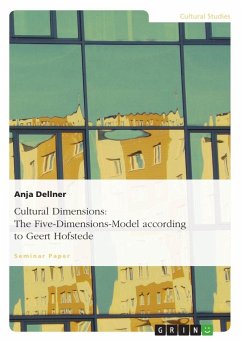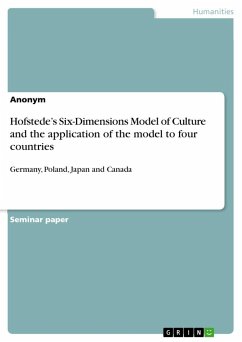Seminar paper from the year 2009 in the subject Cultural Studies - Basics and Definitions, grade: 1,3, Dresden Technical University, language: English, abstract: Be it in the business world, as a traveller, trying to master a foreign language, or to teach it, nowadays we meet people of foreign cultures more frequently than this was the case just 50 or even 100 years ago. Even though linguistic difficulties are often surmountable through English as lingua franca, meeting people from cultures we are unfamiliar with bears the potential for many misunderstandings. These in turn quite often lead to lack of understanding, conflict, even political disaster, like in 2005 with the Danish caricature scandal involving the newspaper Jyllands Posten, when a fundamentalist Muslim cleric from Egypt living in Denmark felt offended and ridiculed in his religious beliefs by caricatures featuring Mohammed. The Islamic world thereby rallied to the case, and did not only react with outrage and boycott, but with violent attacks, in the course of which 140 people lost their lives and several hundred were injured.Milder reactions, like rejection and hidden resentment are, however, the more common outcomes due to intercultural misunderstandings. How otherwise would there be stereotypes mostly carrying negative connotations, like the obedient Chinese, the superficial American, or the super-punctual German lacking humor?The Dutch anthropologist and cultural scientist Geert Hofstede suggests that the reason for such misunderstandings is a culturally divergent, often concealed moral concept with a direct impact on human actions and thinking. Hofstede has devoted himself to this issue and has developed a model based on a long-time study, elucidating peculiarities of and differences between national cultures in comparison. Thereby Hofstede classified national cultures according to five pillars, also called dimensions, which dependent on the nation vary markedly and in his study are setin relation to each other.The subject and the goal of this assignment is to present the main features of Hofstede's Model of the Five Dimensions of National Cultures. Following, the practical applicability of this model is briefly discussed.
Hinweis: Dieser Artikel kann nur an eine deutsche Lieferadresse ausgeliefert werden.
Hinweis: Dieser Artikel kann nur an eine deutsche Lieferadresse ausgeliefert werden.








